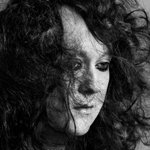|
|
 |
Dusted Reviews
Artist: Antony and The Johnsons Album: Cut the World Label: Secretly Canadian Review date: Aug. 29, 2012 |

|
|
|
 |
After four critically acclaimed and commercially successful albums, it seems appropriate that this latest opus from Antony Hegarty should be a live recording. Even more appropriately, it’s one of the best live albums released by a modern “mainstream” act that I can think of. No exaggeration.
Antony has often said that he functions best on stage, as opposed to in the studio, and any doubts to that fact are dispelled from the opening of “Future Feminism,” the 7-minute monologue that follows the studio-recorded title track and sets up the rest of the live tracks surprisingly well. Far from being a self-indulgent piece of navel-gazing, it’s an often humorous, touching and thoughtful set of meditations on gender, nature and politics, delivered with humility, a touch of self-deprecation and, above all, sensitivity. More than that, “Future Feminism” (and lord knows we need a bit of that in the wake of some of the heinous things said by the likes of Todd Akin and British MP George Galloway) provides a fresh framework in which to approach and appreciate Hegarty’s song, proving he’s more than just a sad-voiced transgender singer who sounds a bit like Nina Simone, but rather a forward-thinking and ambitious modern artist, with a beautiful voice — musically, spiritually and philosophically.
The ensuing series of songs, all familiar, seem to gain strength in this new context. “Cripple and the Starfish” is a monumental beauty, a soaring, multi-layered story-song that builds its complex narrative of domestic abuse to a harrowing climax, somehow managing to be grippingly uplifting, despite lines like “It’s true I always wanted to be / filled with pain / and bruises.” “Epilepsy,” from 2009’s underrated The Crying Light, similarly grows in complexity, from a simple piano and string section all the way up to an elegiac finale, all in the space of less than three minutes. Every track benefits from wonderful orchestral arrangements performed with aplomb by the Danish National Chamber Orchestra, whose discrete virtuosity fits well with the immediacy of the songs’ lyrics and melodies. Depending on the mood of each song, the arrangements veer from lushly cinematic (“Cripple and the Starfish,” “Swanlights,” the marching band drive of epic closer “Twilight”) to stripped-down and intimate, such as on a movingly understated version of “You Are My Sister” and the heart-rending “Another World.”
Soaring over the top of each track is Hegarty himself, for even as his piano is folded into the general arrangements, his voice rises tall and strong, whether whispering sadly about lost relationships and deep pain, or crying out at the injustice and unfairness of the world, or shouting out for acceptance and love. In “Future Feminism,” he describes his music as being a sort of constant cry to heaven, and never is this more apparent than on the breathtaking climaxes to “Cripple and the Starfish” or “Epilepsy.” In a few words, such as “You are my sister / and I love you,” Hegarty conveys more emotion in his voice than most singers manage in a career. It’s enough to make one jealous of the Danish audience who witnessed these performances. Oh, and cherry on the cake, the studio-recorded “Cut the World” is one of his most beautiful songs, a defiant ballad that is both familiar in scope and startling in its aching delivery.
By Joseph Burnett
|







